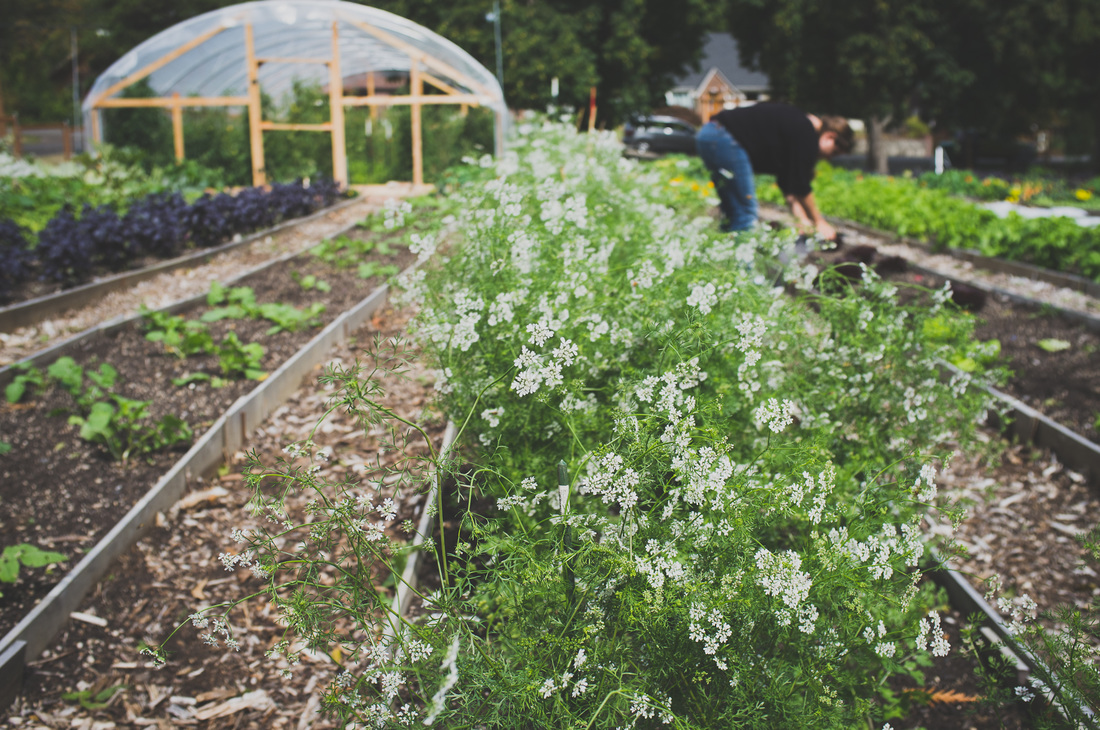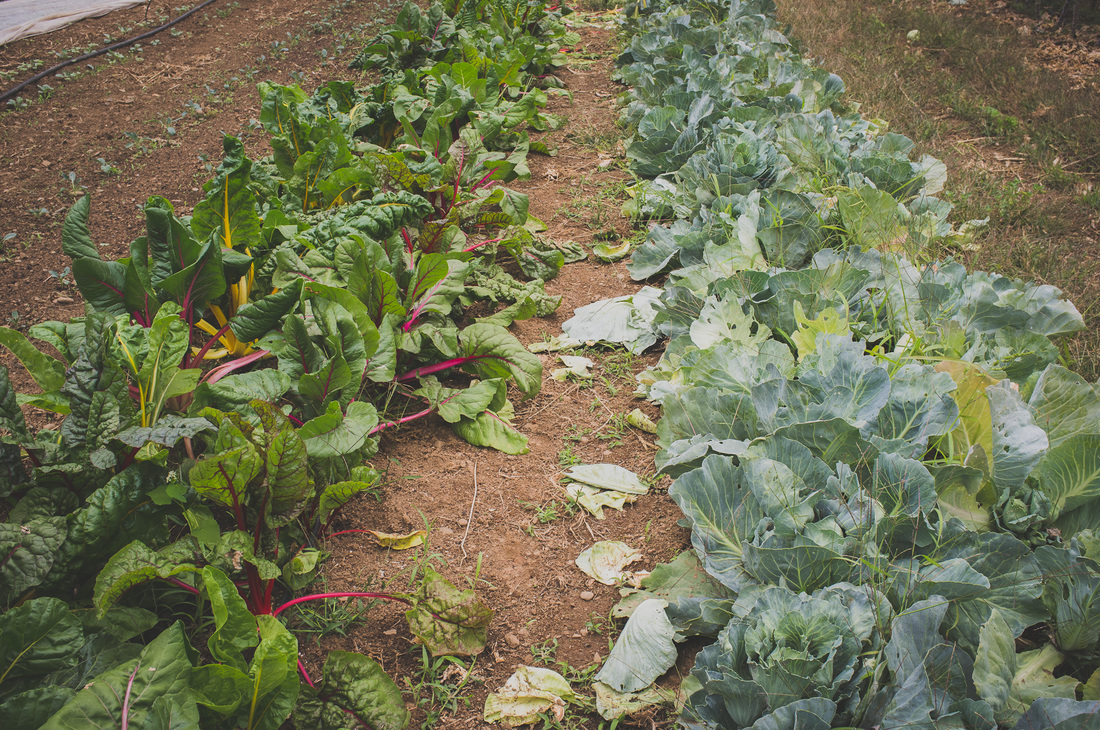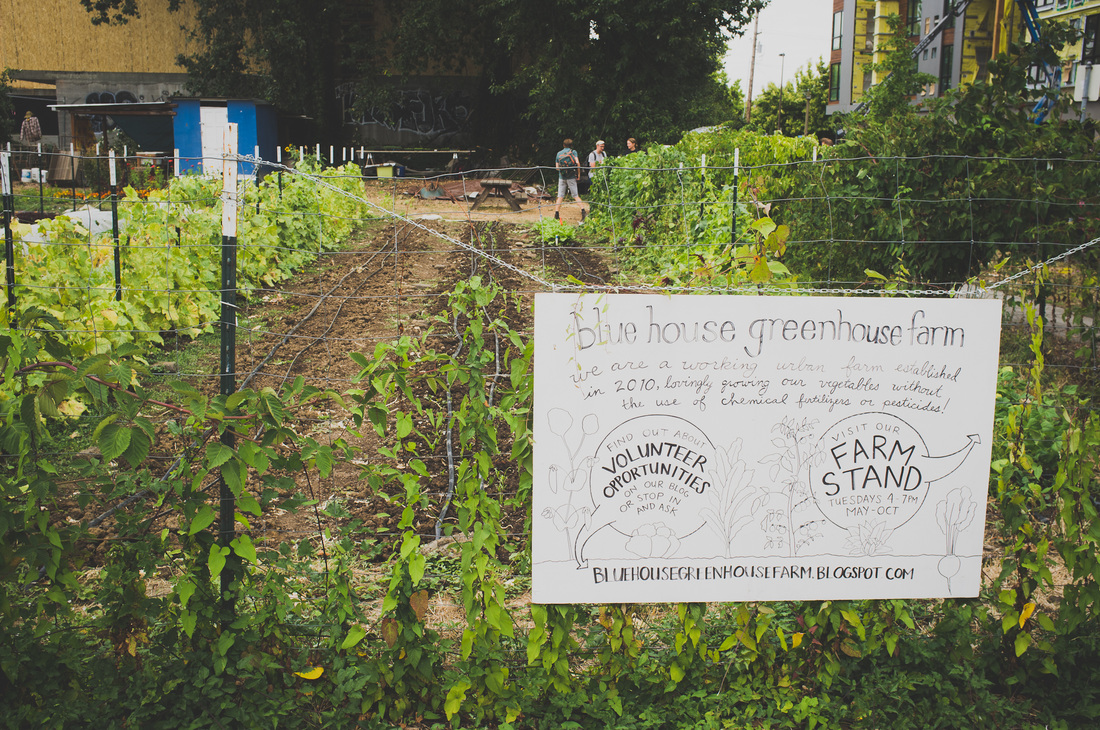During our trip so far, we have visited 3 commercial urban farms. I was quite excited to get to see this form of urban agriculture since it hasn’t really occurred in Montreal as of yet. Maybe it has something to do with the fact that Portland’s urban grid is much less densely built than Montreal’s, with single-family homes on larger parcels dominating the cityscape, which also makes for larger vacant lots. This is particularly true in the Cully neighbourhood, where 2 of the commercial farms are situated. The blocks there are 3 or 4 times the size of blocks in other Portland neighbourhoods, and it feels much more like a suburban neighbourhood.
The first farm we went to see there, Side Yard Farm, was built on a vacant lot of about 0.5 acres that belongs to one of the neighbours. They bought the land around their house to make sure it will not be developed, but were happy to help a young farmer and chef set up an urban farm – they even helped her pay for the permits required to build the installations. This farm grows mostly specialty products that are sold to restaurants or used for the catering component of the business.
The other farm, Cully Neighbourhood Farm, is located on land that belongs to a church and about 0.9 acres are cultivated there by a farmer (who also works as a trainer for the new generation of farmers with Rogue Farm Corps). He used to do CSA baskets and supply to restaurants, but this year he had a busy summer and focused mostly on growing veggies to sell at farmer’s markets and the market stand on the farm.
The third commercial farm we visited is further west, in what was known as the Albina neighbourhood. It is called Blue House Greenhouse and is run by an urban farmer that used to work with non-profits to help combat food insecurity. She is now providing fresh produce to a couple of neighbourhood restaurants and also holds a market on the 0.25 acre farm.
All 3 farms are situated in North-East Portland because lots of vacant lots were available in that area a few years ago when these businesses got started. Now, those neighbourhoods are either experiencing fast change (and by that I mean increased rents leading to displacement of lower income residents and people of colour), as it is for Albina, or are on the verge of experiencing that change, as it is for Cully.
Over the course of these past weeks we’ve been questioning the role of urban agriculture within processes of neighbourhood change, and challenging urban agriculture practitioners to tell us about how they perceive themselves within these processes. And the answers we’ve been getting are similar between the 3 commercial farmers we interviewed – they are aware and concerned with neighbourhood change, but don’t see themselves or their businesses as being detrimental to the community in which they got established.
In all 3 cases, the farmers engage with the community (to various degrees) and they all believe their farm brings significant benefits to their neighbours. Quite simply, they have put in place these farms based on a commercial model because they are trying to do a job they find fulfilling and earn their living this way. But the end result, as I perceive it now, is that these farms contribute to accelerating processes of gentrification of these historically impoverished neighbourhoods, but do not actually help increase food security for the local residents since most of the produce is sold to restaurants in order to keep the farming business minimally profitable.
At the end of the day, this feels heartbreaking since all the people involved have the best intentions: the residents are trying to remain put in their neighbourhood and the farmers are trying to make a living doing a job they are good at (but which just so happens to have perverse negative externalities on the underprivileged residents around them). Looks like something needs to happen to help out these two different stakeholders – collectively, our group of passionate geographers, urban scholars and planners is currently in the midst of trying to come up with solutions. Stay tuned!
Claudia
All 3 farms are situated in North-East Portland because lots of vacant lots were available in that area a few years ago when these businesses got started. Now, those neighbourhoods are either experiencing fast change (and by that I mean increased rents leading to displacement of lower income residents and people of colour), as it is for Albina, or are on the verge of experiencing that change, as it is for Cully.
Over the course of these past weeks we’ve been questioning the role of urban agriculture within processes of neighbourhood change, and challenging urban agriculture practitioners to tell us about how they perceive themselves within these processes. And the answers we’ve been getting are similar between the 3 commercial farmers we interviewed – they are aware and concerned with neighbourhood change, but don’t see themselves or their businesses as being detrimental to the community in which they got established.
In all 3 cases, the farmers engage with the community (to various degrees) and they all believe their farm brings significant benefits to their neighbours. Quite simply, they have put in place these farms based on a commercial model because they are trying to do a job they find fulfilling and earn their living this way. But the end result, as I perceive it now, is that these farms contribute to accelerating processes of gentrification of these historically impoverished neighbourhoods, but do not actually help increase food security for the local residents since most of the produce is sold to restaurants in order to keep the farming business minimally profitable.
At the end of the day, this feels heartbreaking since all the people involved have the best intentions: the residents are trying to remain put in their neighbourhood and the farmers are trying to make a living doing a job they are good at (but which just so happens to have perverse negative externalities on the underprivileged residents around them). Looks like something needs to happen to help out these two different stakeholders – collectively, our group of passionate geographers, urban scholars and planners is currently in the midst of trying to come up with solutions. Stay tuned!
Claudia



 RSS Feed
RSS Feed
